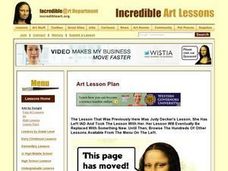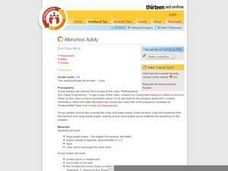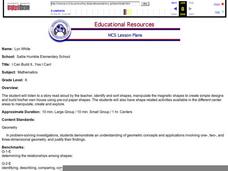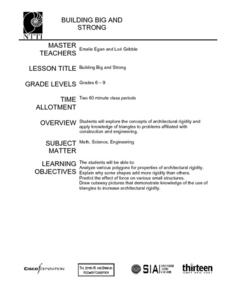Curated OER
Learn the Shapes
Students examine and identify the similarities and differences of two-dimensional shapes. They play an I-Spy shape game, participate in a classroom Shape Search, and create illustrations of shapes for a shape collage.
Curated OER
Draw It!
Students follow directions to make two- and three-dimensional shapes. Focusing on polygons, they use the shapes to solve real-world problems and review with the class. They read two of Shel Silverstein's poems and discuss the...
Curated OER
I've Seen That Shape Before
Students identify geometric solids. In this shape lesson, students explore the characteristics of geometric solids. They locate pictures of shapes on the internet, and identify the shapes. Students draw pictures of shapes, take...
K12 Reader
3-D: It’s Not Just for Movies
This two-part reading comprehension exercise asks kids to read a short passage about cubes, rectangular prisms, spheres and pyramids, and then to respond to a series of questions about the article.
Curated OER
Halves and Fourths
Young mathematicians may not love fractions, but do they love sandwiches? How about cake? Use this visual fractions activity to represent fractions in a relatable way. Scholars start by coloring segmented shapes to indicate halves and...
Curated OER
Paper Maché Mancala Game Boards
Seventh graders create three dimensional works of art from two dimensional plans, develop skills in papier-mach?? technique, utilize elements and principles of design to create 3-D form, and develop math/strategy skills in playing the...
Alabama Learning Exchange
Dog Gone Again!
Here is a real-life lesson plan! Learners must plan the dimensions of a rectangular fence to reign in a runaway dog. They survey what shape and size fence is needed and use formulas to find perimeter and area of the fence. They explore...
Curated OER
Sphere Dressing
Geometric design makes a fashion statement! Challenge learners to design a hat to fit a Styrofoam model. Specifications are clear and pupils use concepts related to three-dimensional objects including volume of irregular shapes and...
Curated OER
Regular Polyhedra
Tenth graders investigate the history of geometry and its different shapes. In this geometry lesson plan, 10th graders practice seeing three dimensional shapes and explain why there are only five polyhedra. They relate all the new...
Curated OER
Rectangular Prism Net
In this geometry worksheet, students cut out a rectangular prism net. They cut along the dotted lines as indicated the scissors icon, and fold the piece along the solid lines to form the three-dimensional shape. There are no directions...
Curated OER
Pass It On
Fifth graders participate in a class activity that helps them learn some geometric terms along with their definitions. They describe relationships between two and three-dimensional shapes and analyze attributes and properties of...
Curated OER
Don't Box Me In
Students explore the relationship between flat and three-dimensional shapes. They identify the names of 3-D shapes and construct cubes from squares.
Curated OER
Who Am I? (Middle School)
Third graders complete a classroom game used to build understanding of two and three-dimensional shapes. Diagonals, sides, regularity, congruency, angle measurements, parallels, perpendicular, faces, and edges are a few of the vocabulary...
Curated OER
Conics in Geometry
High schoolers analyze characteristics and properties of two and three-dimensional shapes in this geometry lesson. They follow detailed directions to use the Cabri Geometry II Application on their TI-89 calculator to construct a...
Curated OER
Branding Circles, Squares, Rectangles, Triangles
Compare and classify 2-D shapes! Kindergarteners inspect the attributes of plane shapes and examine shapes in everyday life. They label the circles, squares, rectangles, and triangles they find. This is the website where you can find the...
Curated OER
Poly-Mania
This hands-on lesson takes young geometers on a tour of 2D polygons and 3D polyhedrons. After exploring different web resources and discussing geometric shapes, small groups construct models of polyhedrons using bendable straws. Note:...
Curated OER
I Can Build It.....Yes I Can!
Kindergartners listen to a story read by their teacher, then use magnetic shape pieces to construct simple designes. They "build" their own house using pre-cut paper shapes. This age-appropriate lesson plan would be an excellent choice...
Statistics Education Web
It Creeps. It Crawls. Watch Out For The Blob!
How do you find the area of an irregular shape? Class members calculate the area of an irregular shape by finding the area of a random sampling of the shape. Individuals then utilize a confidence interval to improve accuracy and use a...
Curated OER
Geo Jammin' By Design - Day 7, Lesson 38: Kool Cups
Create geometric cups by interpreting directions, informational text, and mathematical concepts. Critical thinkers apply geometric theory (congruent shapes, patterns, symmetry) to actual directions to create a cup that holds Kool Aid....
Curated OER
Building Big and Strong
Middle and high schoolers explore the concepts of architectural rigidity. They analyze a variety of polygons, and explain why some shapes add more strength to structures than others. The PBS video, "Building Big," is utilized in this plan.
Curated OER
Copy Cat
Students examine a Webmath page, and demonstrate how to copy and paste. They create a computer-generated template page presenting the attributes of two- and three- dimensional shapes.
Curated OER
Putting It All Together
Students complete activities to learn about the shapes and their vertices. In this shape recognition instructional activity, students discover the rule linking the number of sides with the number of vertices for shapes. Students...
Curated OER
A Sphere and Its Net
Students identify and sketch the nets for sphere. In this geometry lesson, students differentiate between two and three dimensional shapes. They find the surface area of each sphere.
Curated OER
Relating Space and Plane Shapes
For this mathematics worksheet, 1st graders identify which object in an illustration has a flat side the same shape as the box shown. Then they look at other shapes and identify the ones with a flat side, if any.

























